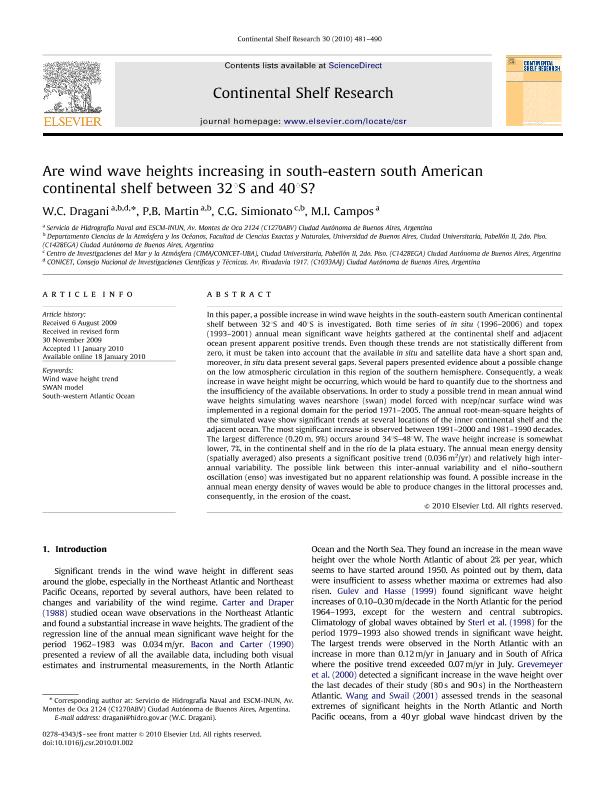Mostrar el registro sencillo del ítem
dc.contributor.author
Dragani, Walter Cesar

dc.contributor.author
Martin, Paula Beatriz

dc.contributor.author
Simionato, Claudia Gloria

dc.contributor.author
Campos, M. I.
dc.date.available
2017-05-31T20:51:30Z
dc.date.issued
2010-03
dc.identifier.citation
Dragani, Walter Cesar; Martin, Paula Beatriz; Simionato, Claudia Gloria; Campos, M. I.; Are wind wave heights increasing in south-eastern south American continental shelf between 321S and 401S?; Elsevier; Continental Shelf Research; 30; 5; 3-2010; 481-490
dc.identifier.issn
0278-4343
dc.identifier.uri
http://hdl.handle.net/11336/17221
dc.description.abstract
In this paper, a possible increase in wind wave heights in the south-eastern south American continental shelf between 32°S and 40°S is investigated. Both time series of in situ (1996–2006) and topex (1993–2001) annual mean significant wave heights gathered at the continental shelf and adjacent ocean present apparent positive trends. Even though these trends are not statistically different from zero, it must be taken into account that the available in situ and satellite data have a short span and, moreover, in situ data present several gaps. Several papers presented evidence about a possible change on the low atmospheric circulation in this region of the southern hemisphere. Consequently, a weak increase in wave height might be occurring, which would be hard to quantify due to the shortness and the insufficiency of the available observations. In order to study a possible trend in mean annual wind wave heights simulating waves nearshore (swan) model forced with ncep/ncar surface wind was implemented in a regional domain for the period 1971–2005. The annual root-mean-square heights of the simulated wave show significant trends at several locations of the inner continental shelf and the adjacent ocean. The most significant increase is observed between 1991–2000 and 1981–1990 decades. The largest difference (0.20 m, 9%) occurs around 34°S–48°W. The wave height increase is somewhat lower, 7%, in the continental shelf and in the río de la plata estuary. The annual mean energy density (spatially averaged) also presents a significant positive trend (0.036 m2/yr) and relatively high inter-annual variability. The possible link between this inter-annual variability and el niño–southern oscillation (enso) was investigated but no apparent relationship was found. A possible increase in the annual mean energy density of waves would be able to produce changes in the littoral processes and, consequently, in the erosion of the coast.
dc.format
application/pdf
dc.language.iso
eng
dc.publisher
Elsevier

dc.rights
info:eu-repo/semantics/openAccess
dc.rights.uri
https://creativecommons.org/licenses/by-nc-nd/2.5/ar/
dc.subject
Waves
dc.subject
Rio de La Plata
dc.subject
Wind Wave Height Trend
dc.subject
Swan Model
dc.subject
South-Western Atlantic Ocean
dc.subject.classification
Oceanografía, Hidrología, Recursos Hídricos

dc.subject.classification
Ciencias de la Tierra y relacionadas con el Medio Ambiente

dc.subject.classification
CIENCIAS NATURALES Y EXACTAS

dc.title
Are wind wave heights increasing in south-eastern south American continental shelf between 321S and 401S?
dc.type
info:eu-repo/semantics/article
dc.type
info:ar-repo/semantics/artículo
dc.type
info:eu-repo/semantics/publishedVersion
dc.date.updated
2017-05-31T19:44:33Z
dc.journal.volume
30
dc.journal.number
5
dc.journal.pagination
481-490
dc.journal.pais
Países Bajos

dc.journal.ciudad
Amsterdam
dc.description.fil
Fil: Dragani, Walter Cesar. Ministerio de Defensa. Armada Argentina. Servicio de Hidrografía Naval; Argentina. Universidad de Buenos Aires. Facultad de Ciencias Exactas y Naturales. Departamento de Ciencias de la Atmósfera y los Océanos; Argentina. Consejo Nacional de Investigaciones Científicas y Técnicas; Argentina
dc.description.fil
Fil: Martin, Paula Beatriz. Ministerio de Defensa. Armada Argentina. Servicio de Hidrografía Naval; Argentina. Universidad de Buenos Aires. Facultad de Ciencias Exactas y Naturales. Departamento de Ciencias de la Atmósfera y los Océanos; Argentina. Consejo Nacional de Investigaciones Científicas y Técnicas; Argentina
dc.description.fil
Fil: Simionato, Claudia Gloria. Consejo Nacional de Investigaciones Científicas y Técnicas. Oficina de Coordinación Administrativa Ciudad Universitaria. Centro de Investigaciones del Mar y la Atmosfera. Universidad de Buenos Aires. Facultad de Ciencias Exactas y Naturales. Centro de Investigaciones del Mar y la Atmosfera; Argentina
dc.description.fil
Fil: Campos, M. I.. Ministerio de Defensa. Armada Argentina. Servicio de Hidrografía Naval; Argentina
dc.journal.title
Continental Shelf Research

dc.relation.alternativeid
info:eu-repo/semantics/altIdentifier/doi/http://dx.doi.org/10.1016/j.csr.2010.01.002
dc.relation.alternativeid
info:eu-repo/semantics/altIdentifier/url/http://www.sciencedirect.com/science/article/pii/S0278434310000117
Archivos asociados
